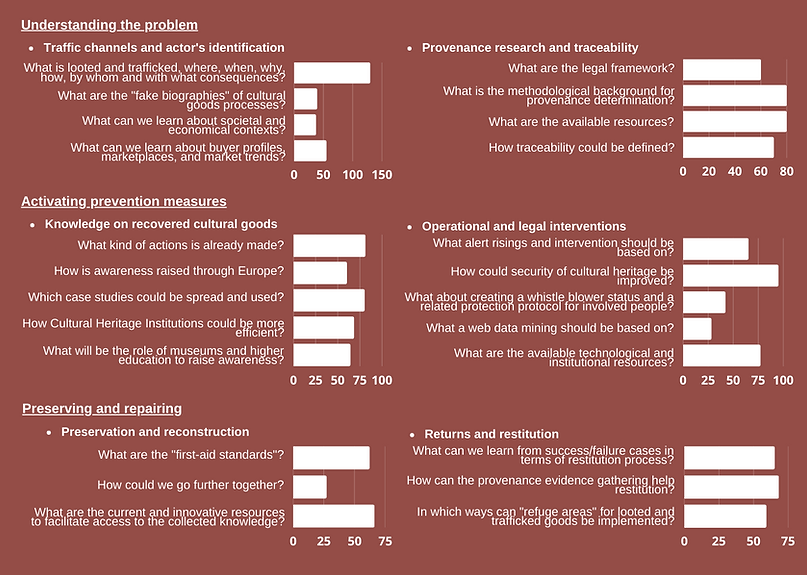

Recursos interns del projecte PITCHER
Guidelines and Recommendations
Teachers and cultural mediators' guide
Are you ready to embark on a journey to protect our shared cultural heritage? The PITCHER guide offers innovative tools and resources to prevent the illicit trafficking of cultural artifacts. Empower your students with engaging activities, real-world case studies, and expert insights. Together, let's inspire the next generation to safeguard history. Dive into the guide and become a cultural guardian today!
Recommendations for policy makers
This document presents comprehensive recommendations to address the pressing issue of archaeological looting and the illicit trafficking of cultural heritage. Developed under the PITCHER project, it outlines strategies to integrate these critical topics into education systems, raise public awareness, and modernize regulations. Our goal is to safeguard cultural heritage for future generations by engaging policymakers, educators, and cultural institutions. We invite you to explore these recommendations and take decisive action. Together, we can protect our shared history.
PITCHER Videos
Results of the NETCHER Project (2019-2021) - Project results (click here):
NETCHER's 3 Policy Briefs, Policy recommendations, Research Agenda
Methods to include a creative and critical thinking approach in education, supporting the fight against illicit trafficking of cultural goods
The first part of the project aimed to create a common framework and methodology. For this purpose, the partners have produced two deliverables, in order to create the Open Educational Resources about the fight against illicit trafficking of cultural goods for teachers and educators:
DELIVERABLE 1.1: Analysis of the existing good practices, resources and initiatives already available.
DELIVERABLE 1.2: Assessment of the needs of teachers, educators, and students.
DELIVERABLE 1.1
State of the art of existing educational activities, curriculum, models, practices, policies, and teachers educational pathways
The objective is to search for all the information existing to date, closely or remotely related to educational resources and the fight against illicit trafficking in cultural property. This takes the form of an overview of existing resources, of which some examples are available below.
Desk research, collect data and basic information from existing resources
-
Prepared using desk research methods of key national and EU documents, regulations, and existing practices
-
Some resources on other related subjects have been also collected, which could be transposed for the creation of Open Educational Resources (e.g., on fight against corruption and awareness of sustainable development)
Research results
-
Provide a broad overview and a definitive summation of the information in participating countries
-
Some of the materials identified are chargeable, however, they can be borrowed from libraries or toy libraries
-
The analysis has shown that there are no real "educational" resources on this topic, in the sense that they have not been designed for this purpose, but there are a few educational actions that could inspire good practices
Discover existing online resources by category:
Observatory illicit traffic, EN/FR, website
UNESCO “Fight illicit trafficking, return and restitution of cultural property", EN/FR, website
HAPPAH, French association : stop the plundering of the archaeological and historical heritage, FR, website
50 years of the fight against the illicit trafficking of cultural goods, EN/FR/E/CAT, online magazine
Fighting the illicit trafficking of cultural property: a toolkit for European judiciary and law enforcement, EN/ES/FR, online book
Culture & development: stop the illicit traffic of cultural property, EN/ES, online magazine
Colloque : Agir ensemble contre le pillage archéologique et le trafic illicite des antiquités, vidéo 1, vidéo 2, FR, YouTube videos
“Antiquités du sang”, quand pillage et pandémie font bon ménage, FR, Podcast
Le trafic d’objets culturels, FR, podcast
Pillages archéologiques. Les “orphelins de l’histoire”, FR, online book
Vaincre le terrorisme et sauver l’art : même combat, FR, PDF
“El retorno de los cascos. Expolio y tráfico ilícito de los bienes arqueológicos; redes, estrategias y procedimientos”, jornadas internacionales contra el expolio y el tráfico de bienes arqueológicos. Zaragoza - 10-12 de diciembre 2021, ES, YouTube video
L’espoli arqueològic a catalunya: sistematització de la tipologia conductual dels furtius, CAT, PDF
Pietro Bozzini, Seppellitemi con lo spillone, 2003, Stampalternativa, IT, online book
Fabio Isman, I Predatori dell’arte perduta. Il saccheggio dell’archeologia in Italia, Skira, 2009, IT, online article
Le Archeomafie: origini, problematiche e possibili strategie di contrasto, Isform, IT, online lesson
DELIVERABLE 1.2
Analysis of Training Needs and Identification of Learning Priorities
The objective is to indentify the main needs of of teachers and educators in terms of training and resources, to define learning priorities, as basis for the developement of Open Educational Resources. It is founded on the results and achievements of the NETCHER project, and on the field experience of professionals.
Defining the Methodology and organising the Questionnaire for collecting information on Training Needs:
-
2 groups of partners: the organizations that participated in the NETCHER project, in order to mobilize the experience and knowledge previously acquired, and the other educational and cultural organizations of the project to mobilize their knowledge of the field
-
The questionnaire aims to lead teachers and educators to identify the most relevant elements for the creation of an educational program and was available in English, French and Spanish, on the internet
Analysis of the Feedback received from Teachers and Educators
-
148 responses of teachers and educators from the different partner countries
-
Few of the suggested items received an interest less than 50%
-
The fight against illicit trafficking of cultural goods is a topic that has been up to now neglected, due to lack of information flow
Discover the answers of teachers and educators by category:



